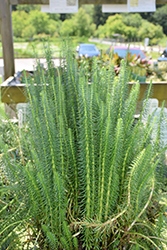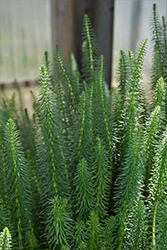It's all about ...
plants

Height: 24 inches
Spread: 3 feet
Sunlight:
![]()
![]()
Hardiness Zone: 4a
Other Names: Mares Tail
Description:
Stands of this aquatic variety resemble a spruce forest in miniature; fine, narrow leaves in whorls, along a central stem; a great water or pondside plant for texture; can never dry out
Ornamental Features
Mare's Tail's attractive narrow leaves remain bluish-green in colour throughout the season on a plant with an upright spreading habit of growth.
Landscape Attributes
Mare's Tail is an herbaceous perennial with an upright spreading habit of growth. It brings an extremely fine and delicate texture to the garden composition and should be used to full effect.
This plant will require occasional maintenance and upkeep, and is best cleaned up in early spring before it resumes active growth for the season. Gardeners should be aware of the following characteristic(s) that may warrant special consideration;
- Spreading
Mare's Tail is recommended for the following landscape applications;
- Mass Planting
- Water Gardens
- Container Planting
- Bog Gardens
Planting & Growing
Mare's Tail will grow to be about 24 inches tall at maturity, with a spread of 3 feet. It grows at a fast rate, and under ideal conditions can be expected to live for approximately 10 years. As an herbaceous perennial, this plant will usually die back to the crown each winter, and will regrow from the base each spring. Be careful not to disturb the crown in late winter when it may not be readily seen!
This plant does best in full sun to partial shade. It prefers to grow in moist to wet soil, and will even tolerate some standing water. It is not particular as to soil type or pH. It is highly tolerant of urban pollution and will even thrive in inner city environments. This species is native to parts of North America. It can be propagated by division.
Mare's Tail is a fine choice for the garden, but it is also a good selection for planting in outdoor pots and containers. With its upright habit of growth, it is best suited for use as a 'thriller' in the 'spiller-thriller-filler' container combination; plant it near the center of the pot, surrounded by smaller plants and those that spill over the edges. It is even sizeable enough that it can be grown alone in a suitable container. Note that when growing plants in outdoor containers and baskets, they may require more frequent waterings than they would in the yard or garden. Be aware that in our climate, most plants cannot be expected to survive the winter if left in containers outdoors, and this plant is no exception. Contact our experts for more information on how to protect it over the winter months.
This plant is not reliably hardy in our region, and certain restrictions may apply; contact the store for more information.

